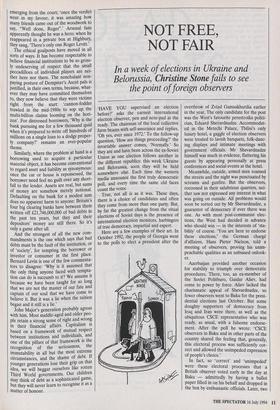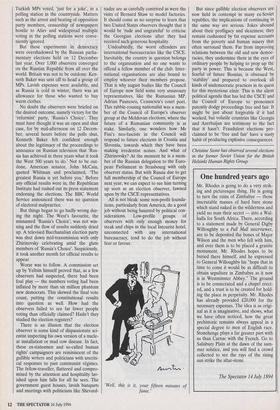NOT FREE, NOT FAIR
In a week of elections in Ukraine and the point of foreign observers
'HAVE YOU supervised an election before?' asks the earnest international election observer, pen and note-pad at the ready. The chairman of the local collective farm beams with self-assurance and replies, 'Oh yes, ever since 1972.' To the follow-up question, 'How are things proceeding?' the invariable answer comes, 'Normally.' So they are and have been across the ex-Soviet Union as one election follows another in the different republics: this week Ukraine and Belorussia, soon they will be held somewhere else. Each time the western media announce the first truly democratic poll, and every time the same old faces count the votes.
True, not all is as it was. These days, there is a choice of candidates and often they come from more than one party. But, by far the greatest change from the ritual elections of Soviet days is the presence of international election monitors, harbingers of true democracy, impartial and expert.
Here are a few examples of their art. In October 1992, the people of Georgia went to the polls to elect a president after the overthrow of Zviad Gamsakhurdia earlier in the year. The only candidate for the post was the West's favourite perestroika politi- cian, Eduard Shevardnadze. Accommodat- ed in the Metechi Palace, Tbilisi's only luxury hotel, a gaggle of election observers were treated to lavish banquets, folk-danc- ing displays and intimate meetings with government officials. Mr Shevardnadze himself was much in evidence, flattering his guests by appearing personally at press conferences and social events at the hotel.
Meanwhile, outside, armed men roamed the streets and the night was punctuated by screams and gunfire. But the observers, cocooned in their salubrious quarters, nei- ther saw nor expressed any interest in what was going on outside. All problems would soon be sorted out by Mr Shevardnadze, a guarantor of democracy if ever there was one. As with most post-communist elec- tions, the West had decided in advance who should win — in the interests of 'sta- bility' of course. 'You are here to endorse these elections,' the German chargé d'affaires, Hans Pieter Nielson, told a meeting of observers, proving his unim- peachable qualities as an unbiased onlook- er.
Azerbaijan provided another occasion for stability to triumph over democratic procedures. There, too, an ex-member of the Soviet Politburo, Gaidar Aliev, had come to power by force. Aliev lacked the charismatic appeal of Shevardnadze, so fewer observers went to Baku for the presi- dential elections last October. But some doughty supporters of democracy from Iraq and Iran were there, as well as the ubiquitous CSCE representative who was ready, as usual, with a fulsome endorse- ment. After the poll he wrote: `CSCE observers in Baku and in other parts of the country shared the feeling that, generally, this electoral process was sufficiently cor- rect and allowed the unimpeded expression of people's choice.'
In fact, so 'correct' and 'unimpeded' were these electoral processes that a British observer voted early in the day at Baku — admittedly by having a ballot paper filled in on his behalf and dropped in the box by enthusiastic officials. Later, two Turkish MPs voted, 'just for a joke', in a polling station in the countryside. Matters such as the arrest and beating of opposition party members, censorship of newspapers hostile to Aliev and widespread multiple voting in the polling stations were conve- niently ignored.
But these experiments in democracy were overshadowed by the Russian parlia- mentary elections held on 12 December last year. Over 1,000 observers converged on the Russian Republic from all over the world. Britain was not to be outdone: Ken- neth Baker was sent off to head a group of MPs. Lavish expenses were available, and as Russia is cold in winter, there was an allowance for those who wanted to buy warm clothes.
No doubt the observers were briefed on the desired outcome, namely victory for the `reformist' party, 'Russia's Choice'. They must have thought it was an open and shut case, for by mid-afternoon on 12 Decem- ber, several hours before the polls shut, Kenneth Baker felt confident enough about the legitimacy of the proceedings to announce on Russian television that 'Rus- sia has achieved in three years what it took the West 500 years to do.' Not to be out- done, American senator, John McCain, quoted Whitman and proclaimed, 'The greatest Russia is yet before you.' Before any official results were in, the Republican Institute had rushed out its press statement endorsing the elections. The BBC World Service announced there was no question of electoral malpractice.
But things began to go badly wrong dur- ing the night. The West's favourite, the misnamed 'Russia's Choice', was not win- ning and the flow of results suddenly dried up. A televised Bacchanalian election party was shut down mid-transmission with only Zhirinovsky celebrating amid the glum members of 'Russia's Choice'. Suspiciously, it took another month for official results to appear.
Worse was to follow. A commission set up by Yeltsin himself proved that, as a few observers had suspected, there had been foul play — the numbers voting had been inflated by more than six million phantom new democrats. This skewed the final vote count, putting the constitutional results into question as well. How had the observers failed to see far fewer people voting than officially claimed? Hadn't they studied the election registers?
There is an illusion that the election observer is some kind of dispassionate sci- entist inspecting his own version of a nucle- ar installation or mad cow disease. In fact, these ex-statesmen and so-called human rights' campaigners are reminiscent of the gullible writers and politicians with uncriti- cal responses to past communist regimes. The fellow-traveller, flattered and compro- mised by the attention and hospitality lav- ished upon him falls for all he sees. The government guest houses, lavish banquets and meetings with politicians like Shevard- nadze are as carefully contrived as were the visits of Bernard Shaw to model factories. It should come as no surprise to learn that two United States observers thought that it would be 'rude and ungrateful' to criticise the Georgian elections after they had received such generous hospitality.
Undoubtedly, the worst offenders are international bureaucracies like the CSCE. Inevitably, the country in question belongs to the organisation and no one wants to offend a fellow member of the club. Inter- national organisations are also bound to employ whoever their members propose. That is why august bodies like the Council of Europe now field some very unsavoury representatives, like the Rumanian MP, Adrian Paunescu, Ceausescu's court poet. This rabble-rousing nationalist was a mem- ber of the Council of Europe's observer group at the Moldovan elections, where the future of a Rumanian community is at stake. Similarly, one wonders how Mr Fini's neo-fascists in the Council will respond to future elections in Croatia and Slovenia, towards which they have been making irredentist noises. And what of Zhirinovslq? At the moment he is a mem- ber of the Russian delegation to the Euro- pean Parliament in Strasbourg with only observer status. But with Russia due to get full membership of the Council of Europe next year, we can expect to see him turning up soon as an election observer, fawned upon by the CSCE representatives.
All is not bleak: some non-profit founda- tions, particularly from America, do a good job without being haunted by political con- siderations. Low-profile groups of observers with only enough money for steak and chips in the local Intourist hotel, unconnected with any international bureaucracy, tend to do the job without fear or favour.
'Well, this is it, your fifteen minutes of fame.'
But since gullible election observers are now held in contempt in many ex-Soviet republics, the implications of continuing in the same way are serious. Jokes abound about their profligacy and sleaziness; they remain cushioned by fat expense accounts from the poverty and human misery that often surround them. Far from improving relations between the old and new democ- racies, they undermine them in the eyes of ordinary people by helping to prop up the party in power. This is because the West, fearful of future Bosnias, is obsessed by 'stability' and prepared to overlook all kinds of undemocratic practices in its quest for this mysterious elixir. This is the silent political agenda that has led the CSCE and the Council of Europe to pronounce patently dodgy proceedings free and fair. It might be just about forgivable if it had worked, but volatile countries like Georgia and Azerbaijan are testimony to the fact that it hasn't. Fraudulent elections pro- claimed to be `free and fair' have a nasty habit of producing explosive consequences.
Christine Stone has observed several elections in the former Soviet Union for the British Helsinki Human Rights Group.



















































 Previous page
Previous page